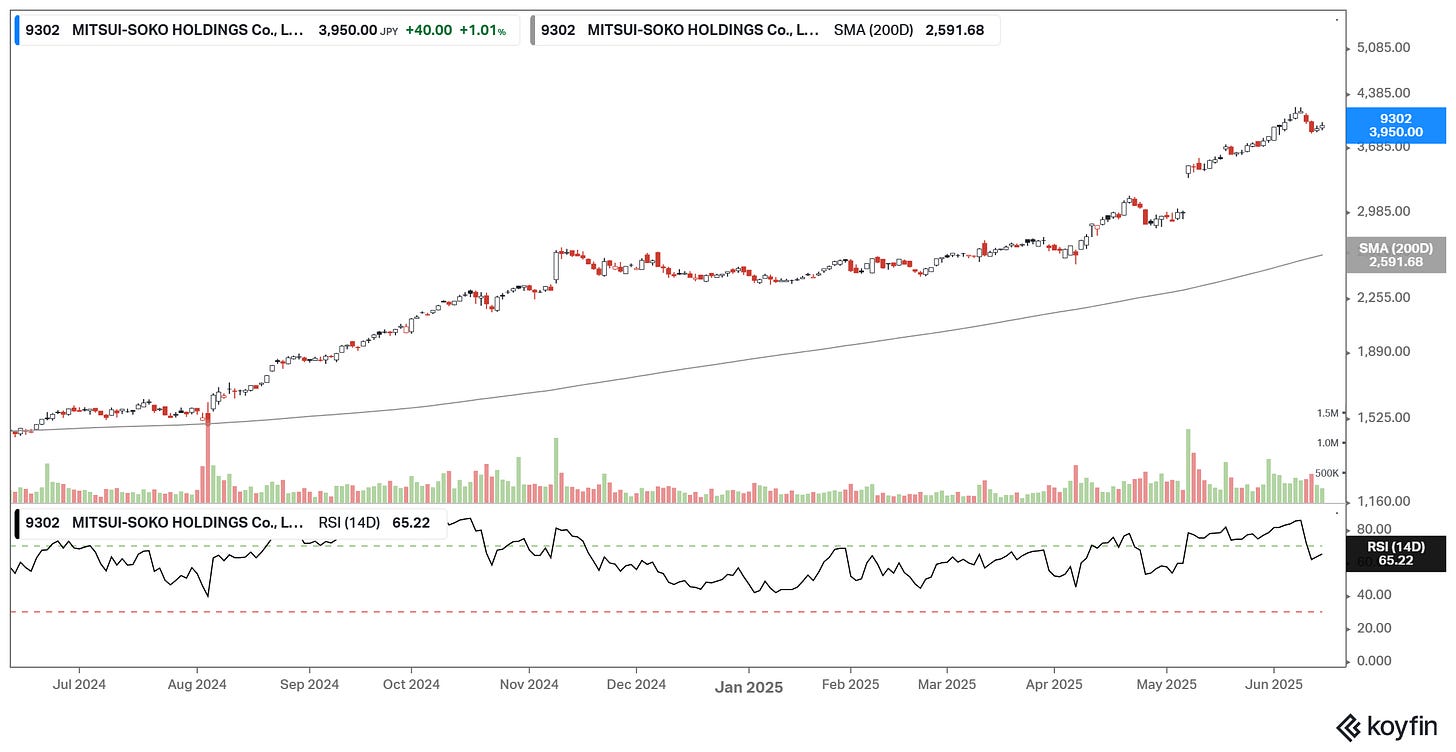The Week That Matters (9-13 June, 2025)
"For Silicon Valley and its idols, innovation is the new selfishness" Evgeny Morozov
This newsletter will argue the following this week:
1. Silicon Valley needs to be reformed.
2. For alpha generation, focus on Japanese small and mid-cap stocks.
Silicon Valley needs a reformation.
The stock market analyst, Tom Lee, is a force of nature, but he got over-excited about the Russel 2000 earlier in the year. The index is a waste of time, full of sub-par, practically insolvent companies, which can’t turn a profit.
President Trump wants the cost of money to go down. That may well give the index a reprieve, but it won’t last long. In the 2010s, we learnt one thing: low rates support large cap compounders. The US economy rewards companies with barriers to entry and scale. It’s harsh to companies, which have to sing every day for their supper.
The author doesn’t care much either way. His attention has shifted elsewhere. US large cap tech doesn’t offer the same risk reward as it did in the past. Valuations are high, the political situation is toxic, and the US dollar is vulnerable. He has also grown tired of Silicon Valley’s hubris.
As he’s old, he remembers the term “crony capitalism” from the Asian Crisis of 1997/98. Crony capitalism is an economic system in which business success depends on close relationships between businesspeople and government officials, rather than on open competition and market forces. In his mind, Silicon Valley is the best example of crony capitalism today. It is full of insiders spewing narratives that only help those in the club, not the broader public.
Unfortunately, the public confuses ever increasing valuations and incremental tech with breakthroughs and progress. They’re not the same thing. Despite AI, smartphones, and cloud computing, productivity growth has remained sluggish. This is no Victorian Age of Technology.
Deep down we kind of know that. Although we nostalgically remember the history of Intel, Apple and Qualcomm, we know Silicon Valley isn’t the center of innovation it once was. The focus has been all wrong. With the exception of some of what Musk has achieved, there are few bold engineering moonshots. Instead, the Valley doubled down on software that maximizes attention, not output, surveillance tech and solutions that get poor people to spend money they don’t have (most of fintech?). Has anything significant come out of Silicon Valley since PayPal?
And AI has only been embraced the way it has, very much like defense tech, because Silicon Valley had a crisis in 2021/2022. Software hadn’t eaten the world, blockchain companies were failing hopelessly, and not every company had become a fintech. Tech oligarchs had run out of spin. Their capital raising initiatives with institutions needed a new narrative.
Unbelievably, Sam Altman this week argued AI would be smarter than humans before we know it. Really? Why are these guys always pushing some dystopian message? Didn’t Apple just undermine the reasoning hype about AI, anyway? AI is without doubt going to be a supremely good pattern recognition tool but LLMs are not going to lead to AGI! Let’s get real!
Barbarians at the Gate
The author blames the demise of Silicon Valley on three things:
1. The PayPal Mafia became too strong and created an incestuous stranglehold on innovation.
2. The advent of the cloud allowed for a spray and pray approach to innovation, which was completely different to the approach of Kleiner Perkins in the 1980s and 1990s.
3. The over financialization of the economy has meant there’s just been too much money around for dumb-arse projects. WeWork?
The last point is the most interesting to the author. There’s an awful lot of money around but he’s not sure the mechanisms are working to get it into the hands of the best and brightest. This is nothing new. As discussed recently, great societal wealth can create an uncreative rentier class, that gets consumed by its own bullshit. There might be a lot of money in the system, but the system ends up allocating it to the wrong people. How else do you explain Sam Altman?
The barbarians are clearly at the gate. We’ve had a succession of Kodak moments out of China over the last 6 months with electric vehicles, AI and aviation, but it’s not just China. The author suggests digging deep into the IOWN technology that Japan’s NTT began rolling out this week.
If that technology had come out of Silicon Valley, it would have had a nose-bleed valuation already. The Founder would be doing podcasts with Chamath and giving us an uneducated take on geopolitics. Why do tech bros all sound like fascists now, btw?
Peter Thiel loves to talk about business with no competition but Silicon Valley’s focus on monopoly building has resulted in it producing companies that aren’t particularly competitive. They’re good from zero to one but if they don’t get the critical scale, and that’s much harder in non-digital fields, the products just aren’t that competitive. Haven’t we already seen that with Tesla?
Henry Ford was a beast. He built a business on private money and competed ably for many years. Elon Musk is no Ford. He’s a welfare whore, who works best when there’s no competition. Perhaps he should just stick with Space X and forget Tesla all together. It’s going the way of the Soviet Union’s Skoda car, no matter what Cathy Woods says. She gets invited to the parties, by the way. She’s an insider too.
Where is the alpha?
The author has mentioned a few European mid-caps before and of course, he has written extensively on Australian resource names. For him, all roads lead to gold. He strongly believes the next set of results from the gold miners will confirm they have become cash flow machines (not financial advice).
But as he cut his teeth in Japan, the author’s focus has been increasingly on what’s happening there, especially in the small and mid-cap space. He has flagged the reasons why Japanese equities remain one of the most interesting markets in the world right now, but a lot of his focus has been on Japanese large cap names.
There was a reason behind this. Like elsewhere, Japanese large caps such as Hitachi and MHI have made up most of the performance attribution in Japan. Will that stop? Not necessarily. The themes are just too good (defense spending, digitalization etc.) and many names are cleaner (less option dilution) and cheaper plays on current themes (AI data centers). Nevertheless, it would seem that the small end of town is starting to finally get the love it deserves.
The Russell 2000 might be full of undercapitalized, lousy businesses but Japan’s smaller businesses, on the other hand, are well capitalized, are increasing dividends and executing buybacks and cutting costs. And the valuations are just too cheap. Tom Lee would have been much wiser to have got excited about them rather than the constituents of the Russell 2000 earlier in the year.
Generational Wealth: Unsexy Japanese companies?
Recently, the author got lucky. He bought Nebius (NBIS) on a recommendation from a friend. The stock roofed it. The performance has obviously been well received but it’s also one of those investments that it feels good to talk about. It’s doing something cutting edge. There are lots of buzzwords. Think AI. Think AI infrastructure. The narrative rolls off the tongue.
Unfortunately, that’s not the case for Japanese smaller issues. Of course, there are some promising SaaS businesses and the like, but to do well in Japan, you have to be willing to dig into traditional industries. Think manufacturing components, logistics, industrial equipment, packaging, or food processing.
A good example of a dull stock is 9302 Mitsui Soko. It operates in the logistics/warehouse industry and has been on a tear over the past year. The street seemed to wake up recently and revised up their numbers. At 1x book, it still has a long way to go in the author’s opinion (not financial advice). Not only is it executing well in a difficult environment, but it has also embraced corporate reform and been increasingly generous to shareholders. That might be the reason why it has crushed other global logistic stock performance this year!
If you have interest in Japanese stocks, please reach out. The author is building out his Japanese small and mid-cap stock brokerage business and will be producing a Japanese focused newsletter every week.
As always, thanks for reading. Wishing you a very positive week with family, trading and business. Pray for peace.
Best regards
Mateen






you’re talking about lada, not skoda, i think 😌